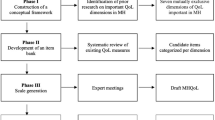Abstract
PURPOSE: The purpose of this study was to examine the association between coping behavior at the time of surgery and inflammatory bowel disease-related quality of life after surgery. We also investigated the relationship between perceived social support and both coping style and postsurgical quality of life. Finally, the value of the Medical Outcomes Study Social Support Scale for preoperative screening was assessed. METHODS: Eighty-six subjects who had surgery during a 12-month period completed the Inflammatory Bowel Disease Questionnaire, the Ways of Coping, a measure of inflammatory bowel disease symptom severity, and the Medical Outcomes Study Social Support Scale. Analysis of variance was used to test an association between Ways of Coping score and membership in a high quality of life (Inflammatory Bowel Disease Questionnaire > mean) or low quality of life (Inflammatory Bowel Disease Questionnaire < mean) cohort. Comparison of group means between the high quality of life and low quality of life cohorts identified Ways of Coping behavior scales that differed between the high quality of life and low quality of life cohorts. Stepwise linear regression analysis was then used to determine the independent contribution of 1) current inflammatory bowel disease symptoms, 2) current perceived social support, and 3) identified coping behaviors (self-control, self-blame, and escape, summed as a single index named “maladaptive coping”) to postsurgical quality of life. The sensitivity, specificity, and negative predictive value of the Medical Outcomes Study Social Support Scale were assessed. RESULTS: The lower quality of life group distinguished itself by more frequent use of maladaptive coping. Regression analysis revealed that current inflammatory bowel disease-related symptoms, current perceived social support, and maladaptive coping behaviors at the time of surgery each made a highly significant independent contribution to postsurgical quality of life. The sensitivity of the Medical Outcomes Study Social Support Scale in identifying patients with poor postsurgical quality of life was 81 percent, and the specificity was 77 percent. The negative predictive value was 93 percent. CONCLUSIONS: Three coping behaviors which seem to be maladaptive (self-control, self-blame, and escape) are associated with lower quality of life after surgery for inflammatory bowel disease. These coping behaviors make a contribution to postsurgical quality of life independent of the negative effect on quality of life of inflammatory bowel disease symptoms. Perceived social support is a third factor that makes an independent contribution to postsurgical quality of life. The Medical Outcomes Study Social Support Scale has properties associated with an effective screening tool and merits further investigation as an instrument to screen presurgically for individuals at higher risk of poor subjective outcome of inflammatory bowel disease surgery.
Similar content being viewed by others
References
Shorb PE. Surgical therapy for Crohn's disease. Gastroenterol Clin North Am 1989;18:111–28.
Cohen Z. Why not just cut out my disease? Can J Gastroenterology 1994;(Suppl):53–9.
Drossman DA. Psychosocial factors in ulcerative colitis and Crohn's disease. In: Kirsner JB, Shorter RG, eds. Inflammatory Bowel Disease. 4th ed. Baltimore: Williams and Wilkins, 1995:492–513.
Guyatt G, Mitchell A, Irvine E,et al. A new measure of health status for clinical trials in inflammatory bowel disease. Gastroenterology 1989;96:804–10.
Maunder RG, Cohen Z, McLeod RS, Greenberg G. Effect of intervention in inflammatory bowel disease on health-related quality of life: a critical review. Dis Colon Rectum 1995;38:1147–61.
Aldwin CM. Stress, coping, and development. An integrative perspective. New York: Guilford Press, 1994.
Broadhead WE, Kaplan BH, James SA,et al. The epidemiologic evidence for a relationship between social support and health. Am J Epidemiol 1983;117:521–37.
Milne B, Joachim G, Niedhardt J. A stress management programme for inflammatory bowel disease patients. J Adv Nurs 1986;11:561–7.
Kinash RG, Fischer DG, Lukie BE, Carr TL. Coping patterns and related characteristics in patients with IBD. Rehabil Nurs 1993;18:12–9.
Sherbourne CD, Stewart AL. The MOS social support survey. Soc Sci Med 1991;32:705–14.
von Wietersheim J, Köhler T, Feiereis H. Relapseprecipitating life events and feelings in patients with inflammatory bowel disease. Psychother Psychosom 1992;58:103–12.
Maunder RG, Lancee WJ, Esplen MJ, Greenberg GR. Improvement in inflammatory bowel disease-related quality of life, days off work and somatization with group psychotherapy [abstract]. Gastroenterology 1998;14(Suppl 5):G4236.
Author information
Authors and Affiliations
Additional information
Presented in part at the meeting of The American Psychosomatic Society, Vancouver, British Columbia, Canada, March 17 to 21, 1999.
About this article
Cite this article
Moskovitz, D.N., Maunder, R.G., Cohen, Z. et al. Coping behavior and social support contribute independently to quality of life after surgery for inflammatory bowel disease. Dis Colon Rectum 43, 517–521 (2000). https://doi.org/10.1007/BF02237197
Issue Date:
DOI: https://doi.org/10.1007/BF02237197




